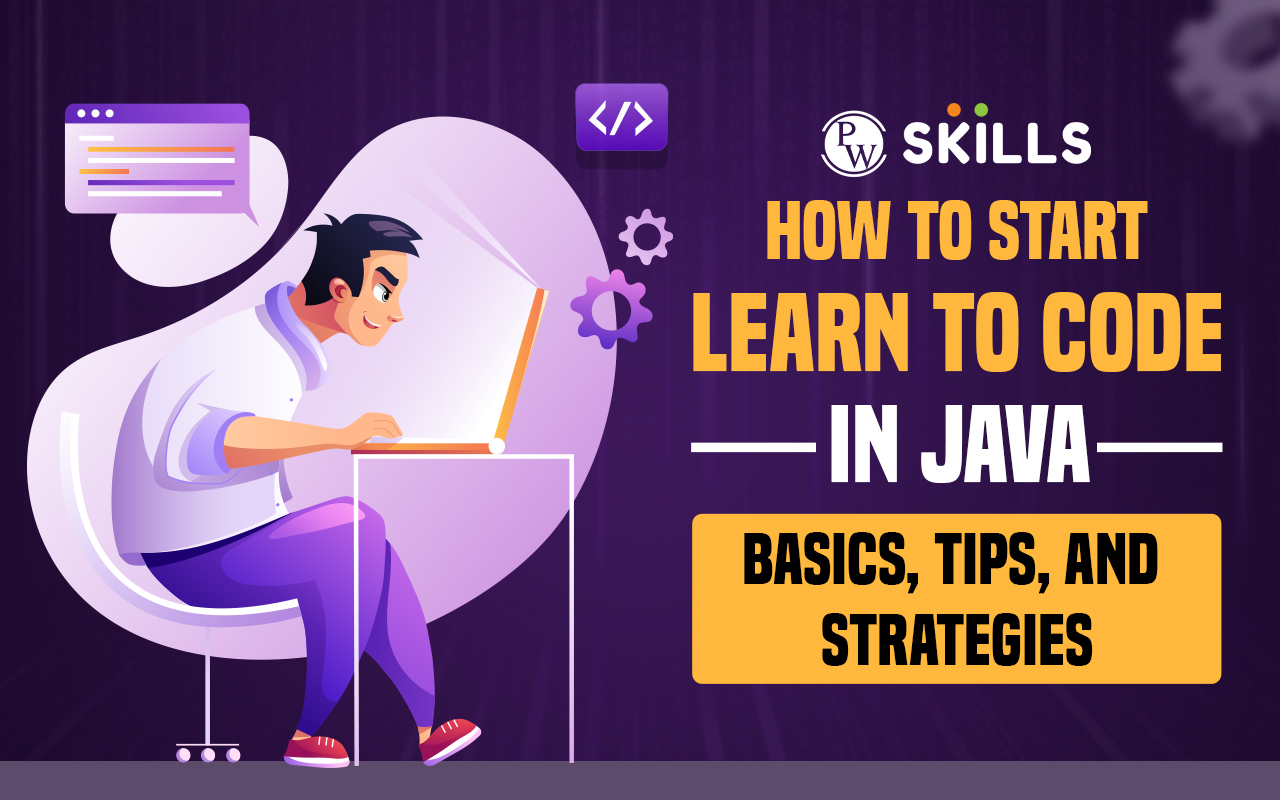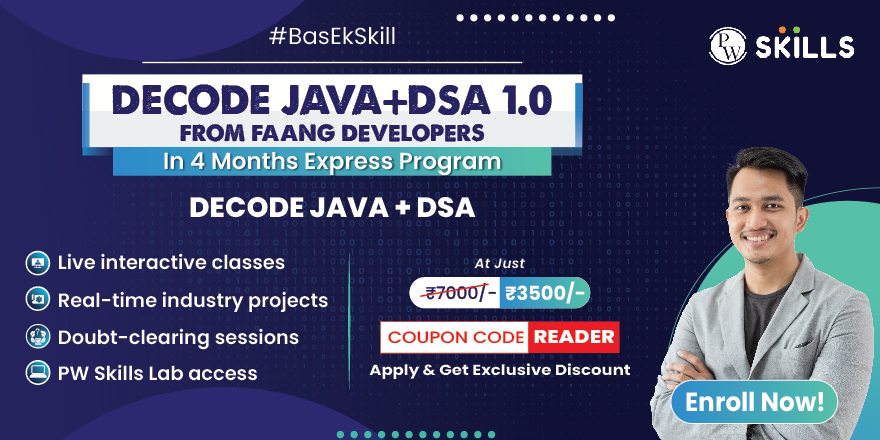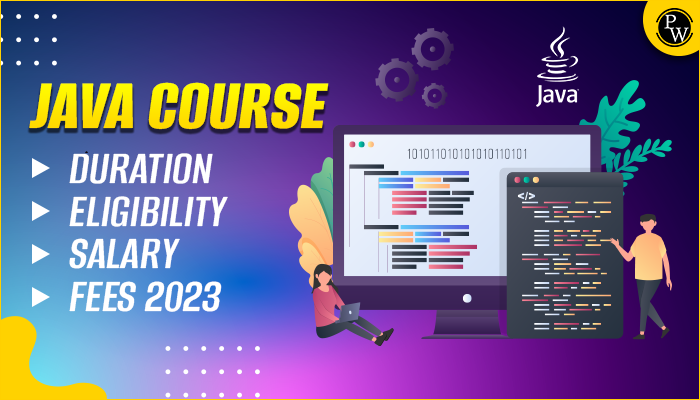If you want to learn to code Java, then you’re at the right place. Java is a versatile programming language and is an excellent choice for beginners. Learn more about how to learn Java in this blog!
Learn to Code Java: Starting with Java programming opens a door to versatile and powerful software development. Java, recognized for its portability and readability, is extensively utilised in web and mobile applications, enterprise solutions, and Android development.
Having a syntax similar to other C-based languages, Java is easy for beginners and comes with robust community support. As an object-oriented language, it encourages modular and scalable code.
Learning Java introduces you to important concepts like classes, objects, inheritance, and polymorphism. Java’s “Write Once, Run Anywhere” philosophy makes it a valuable skill for creating cross-platform applications, making it a great option for those stepping into the coding world.
What Are the Features of Java?
Here are the main features of Java:
- Java is a simple language: Learning Java is straightforward, and its syntax is straightforward and concise. It’s built on C++, making it more accessible for those familiar with C++. Java eliminates confusing and seldom-used elements like explicit pointers and operator overloading. Additionally, Java handles memory management and features an automatic garbage collector that efficiently removes unused objects.
- Java is a platform-independent language: Java programs, once compiled, transform into an intermediate language known as bytecode. This bytecode is integral to the Java platform and works regardless of the machine running the programs. This characteristic enhances Java’s portability, allowing its bytecodes to be executed on any machine using an interpreter known as the Java Virtual Machine (JVM). Consequently, Java facilitates the ‘reusability of code’.
- Java is an object-oriented programming language: Object-oriented programming (OOP) simplifies the entire program by breaking it down into various objects. These objects serve as a connection for data to move between different functions. Modifying data and functions according to the program’s needs can be done effortlessly.
- Java is a robust language: Java programs need to be dependable as they are utilised in various applications, including consumer electronics like Blu-ray players and essential systems like navigation systems.
- Java is a multithreaded language: Java can handle numerous tasks concurrently by specifying multiple threads. For instance, a program overseeing a Graphical User Interface (GUI) and simultaneously awaiting input from a network connection employs a separate thread to execute and wait instead of relying on the default GUI thread for both tasks. This ensures the responsiveness of the GUI.
- Java programs can create applets:Applets are software applications that operate within web browsers. However, support for applets was deprecated in the Java 9 release and completely eliminated in the Java 11 release. This decision was influenced by diminishing browser support for the Java plugin.
- Java does not require any preprocessor: It does not require inclusion of header files for creating a Java application.
Also read: OOPS Concepts in Java: What It Is, Why Is it Called That, Advantages, and More
Learn to Code Java in 2024: Essential tips to Get you Started
Before you venture onto your journey to learn to code Java, there are some tips that can help you a lot. Here are a few of them:
- Understand the basics: Understanding the fundamentals of a programming language holds great significance. It serves as the most effective starting point for acquiring new knowledge. Do not feel stressed; instead, initiate the process of grasping the language’s concepts. Familiarise yourself with the environment, and soon you’ll become accustomed to it effortlessly.
- Patience is the key: Embarking on the journey of learning Java might seem daunting due to the vast amount of material available on the language. However, stay patient, go at your own speed, and avoid rushing. Mastering Java is a gradual process that requires time. Keep in mind that even the most skilled coders started from the beginning at some point. So, it’s not a significant challenge; just take your time. So as much as you can and keep going. Give it your time. Patience is the key to success.
- Practice Coding: After grasping the fundamentals, it’s wise to enhance your abilities through consistent practice. Genuine understanding develops when you apply what you’ve learned, following the saying ‘Practice Makes a Man Perfect.’ Therefore, focus on coding more than just reading. This approach will boost your confidence. Keep in mind that perfect practice leads to perfection.
- Study in a Group: Studying in a group is an effective method to grasp new concepts. It allows you to discover different aspects of a topic as everyone shares their ideas. Additionally, you can engage in discussions and promptly resolve coding issues. Connect with a consistent group of individuals who share an interest in learning Java.
Get help from a tutor and read as many books about java as possible. There are many good books in the market that will help you in learning java.
Best Website to Learn to Code Java in 2024
One of the best websites to learn to code Java is PW Skills by PhysicsWallah. PW Skills offers an interactive and hands-on learning experience that is particularly suitable for beginners. The platform provides a comprehensive Java course that covers the fundamentals, object-oriented programming concepts, and advanced topics.
The PW Skills Java course is organised into lessons, where each lesson builds upon the one before. This step-by-step method ensures a strong grasp of Java syntax, control flow, and data structures. The platform includes interactive coding exercises, enabling learners to practise Java coding directly in their web browser.
Recommended Technical Course
- Full Stack Web Development Course
- Generative AI Course
- DSA C++ Course
- Java+DSA 1.0 Course
- Data Analytics Course
- Data Science with ML 1.0 Course
Java Best Practices and Tools
There are certain Java practices and tools that will make your Java kearney a whole lot easier. Here are a few of them:
- Coding Standards: Adhere to consistent coding styles and follow Java naming conventions for readability.
- Documentation: Include meaningful comments and documentation to explain complex code segments.
- Unit Testing: Implement unit tests using frameworks like JUnit or TestNG to ensure code reliability.
- Version Control (Git): Utilise Git for version control, enabling collaboration and tracking changes effectively.
- Build Tools (Maven/Gradle): Leverage build tools like Maven or Gradle for dependency management and streamlined builds.
- Static Code Analysis: Employ tools like SonarQube or FindBugs to analyse code statically, identifying potential issues.
- Continuous Integration: Integrate CI/CD pipelines (Jenkins, Travis CI) for automated testing and deployment.
- Code Reviews: Conduct regular code reviews to catch errors, promote best practices, and share knowledge.
- Dependency Management: Manage dependencies carefully, specifying versions and avoiding unnecessary dependencies.
- Logging: Use logging frameworks like SLF4J and Logback to ensure effective debugging and monitoring.
- Secure Coding Practices: Adhere to secure coding principles to mitigate vulnerabilities and protect against threats.
- Memory Management: Pay attention to memory management, avoiding memory leaks and optimising resource usage.
- Error Handling: Implement robust error-handling mechanisms to handle exceptions and failures gracefully.
- Performance Tuning: Profile and optimise code for performance using tools like VisualVM or YourKit.
By incorporating these best practices and tools into Java development, programmers can foster a collaborative, efficient, and secure coding environment while delivering high-quality software.
Also read: OOPs Concepts in Java with Examples & Interview Questions
Advanced Java Concepts
Advanced Java concepts extend beyond the basics, providing developers with powerful tools and techniques to create sophisticated, scalable, and efficient applications.
- Multithreading: Involves executing multiple threads simultaneously, improving program efficiency by parallelizing tasks.
- Exception Handling: Advanced handling of exceptions, including custom exception classes and precise error diagnostics.
- File Handling: Advanced file operations, such as random access, serialisation, and working with different file formats.
- Collections Framework: A comprehensive set of interfaces and classes for managing and manipulating groups of objects, including lists, sets, maps, and queues.
- Networking: Creating networked applications using Java, covering sockets, protocols, and client-server communication.
- Database Connectivity (JDBC): Connecting Java applications to relational databases, executing SQL queries, and handling database transactions.
- Annotations: Using metadata annotations for code documentation, configuration, and enhancing runtime behaviour.
- Reflection: Dynamically inspecting and modifying classes, methods, and fields at runtime for advanced programming scenarios.
- Lambda Expressions: Functional programming constructs for concise and expressive code, enhancing readability and flexibility.
- Streams API: Processing sequences of elements efficiently using functional-style operations, promoting clean and concise code.
- JavaFX: Building rich graphical user interfaces (GUIs) with JavaFX, including scene graphs, controls, and styling.
- Concurrency Utilities: Higher-level abstractions for concurrent programming, including Executors, Futures, and Callable.
- Servlets and JSP: Developing dynamic web applications using Java servlets for server-side logic and JavaServer Pages (JSP) for UI presentation.
- Hibernate (ORM): Object-relational mapping for simplified database interaction, allowing Java objects to be persisted in relational databases.
Understanding and mastering these advanced Java concepts empowers developers to tackle complex projects, optimise performance, and build scalable and maintainable software solutions.
Also read: OOP Principles: 4 Principles of Object Oriented Programming
Object-Oriented Programming (OOP) in Java
Object-Oriented Programming (OOP) is a fundamental paradigm in Java, providing a systematic approach to software design and development. Java is an object-oriented language, and its OOP principles revolve around the concepts of encapsulation, inheritance, polymorphism, and abstraction.
- Encapsulation: Encapsulation involves bundling data (attributes) and methods (functions) that operate on the data within a single unit known as a class. This concept promotes data hiding and protects the internal implementation details of an object.
- Inheritance: Inheritance allows a class (subclass or derived class) to inherit the attributes and methods of another class (superclass or base class). This promotes code reusability and establishes an “is-a” relationship between classes.
- Polymorphism: Polymorphism enables a single entity, such as a method or operator, to take on multiple forms. In Java, this is achieved through method overloading (same method name, different parameters) and method overriding (providing a specific implementation in a subclass).
- Abstraction: Abstraction involves simplifying complex systems by modelling classes based on their essential characteristics. Abstract classes and interfaces in Java allow developers to define abstract types, leaving the concrete implementation details to the subclasses.
Object-Oriented Concepts in Java:
- Classes and Objects: A class is a blueprint for creating objects, which are instances of classes. Classes define the attributes and behaviours shared by objects of that type.
- Constructors and Destructors: Constructors initialise objects, and Java provides a default constructor if one is not explicitly defined. Java lacks destructors, but objects are automatically garbage-collected when they are no longer referenced.
- Methods and Fields: Methods are functions defined within a class, and fields are variables that store data. Methods represent the behaviour of objects, while fields represent their state.
- Access Modifiers: Access modifiers (public, private, protected) control the visibility of classes, methods, and fields. This helps manage the scope and accessibility of members within a class.
- Interfaces and Abstract Classes: Interfaces define a contract for implementing classes, while abstract classes provide a partial implementation and cannot be instantiated. Both support achieving abstraction and designing for flexibility.
In Java, OOP principles enhance code organisation, promote modularity, and facilitate the development of scalable and maintainable software. Understanding these principles is crucial for harnessing the full power of Java and building robust applications.
Mastering object-oriented programming (OOP) principles in Java is essential for building efficient, scalable, and maintainable software solutions. The concepts of encapsulation, inheritance, polymorphism, and abstraction form the foundation of Java’s OOP paradigm, providing a structured and modular approach to software development.
By embracing these principles, developers can create code that is more readable, reusable, and adaptable to changing requirements. Java’s rich set of OOP features, combined with its versatility, makes it a powerful language for crafting complex applications and underscores the significance of OOP in shaping the modern software development landscape.
Also read: OOPS Concepts In Python: Features, Objects, Composition vs Inheritance
FAQs
What is Java?
Java is a versatile, object-oriented programming language known for its portability and compatibility, used in various domains, from web development to mobile applications.
Why learn Java?
Learning Java provides a solid foundation in programming, as it is widely used, has a vast community, and is the language of choice for Android app development.
How to start learning Java for beginners?
Start with basic syntax, control structures, and object-oriented concepts. Practice coding regularly and explore Java's extensive libraries to build hands-on experience.
What are the key features of Java?
Java boasts features like platform independence, automatic memory management, and a rich set of APIs, making it suitable for developing diverse applications.
Is Java still relevant in 2023?
Yes, Java remains highly relevant due to its stability, performance, and continuous updates. It is extensively used in enterprise applications, cloud computing, and emerging technologies like big data and machine learning.




